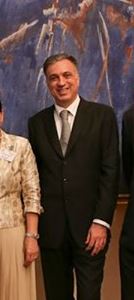Filip Vujanovic
Filip Vujanović was born September 1, 1954 and serves as the current President of Montenegro since he was elected in 2003 as the country's first President since its independence in June 2006. His 2008 presidential campaign led to a landslide victory and was followed by another victory in 2013.
Political Career[edit]
Vujanović graduated from the University of Belgrade's Law School. Between 1978 and 1981 he worked in one of the city's Municipal Courts, and later also as an assistant at the Belgrade District Court. In 1981, aged 27, he moved to Titograd where he worked as a solicitor until entering politics in March 1993.
Vujanović joined the Democratic Party of Socialists (DPS) in 1993 following the creation of the Federal Republic of Yugoslavia, made up of Montenegro and Serbia, after the break-up of Yugoslavia. He was a Minister of Justice in Milo Đukanović's government from 1993 until 1996 and then Interior Minister from 1996 to 1998. Đukanović then appointed Vujanović as the first Prime Minister of Montenegro from February 5, 1998 until January 8, 2003.
November 5, 2002, Vujanovic became speaker of the Montenegrin parliament and then acting President of Montenegro due to the resignation of Đukanović. Vujanović ran in the December 2002 presidential elections where he received 86% of the vote, a vote which was then ruled invalid because of its low turnout. Elections were held again in May 11, 2003, with the minimum turnout rule abolished, and Vujanović won with 63% of the vote.
Vujanović resigned from his positions as speaker and acting president on May 19, 2003 but became president of Montenegro again three days later when his term began. Even though he was born and raised in Serbia, he was one of the most prominent Montenegrin secessionists. Vujanović represents a more moderate ideology unlike Milo Đukanović who advocates a more extreme outlook. As president of Montenegro, Vujanović was a supporter of the Montenegro independence referendum, though Prime Minister Đukanović was much more high-profile in his campaign for it. Vujanović’s messages often focus on Montenegro's and Serbia's ability to have a peaceful separation and post-independence cooperation, and he is friends with former Serbian president Boris Tadić. [1] On May 21, 2006, an independence referendum was held in Montenegro; it was approved by 55.5% of voters, narrowly passing the 55% threshold. On June 3, 2006, Montenegro became an independent state. On December 14, 2006, he signed the Framework Document for the accession to the Partnership for Peace Programme, wherewith Montenegro became a member of the NATO program "Partnership for Peace". During the press conference that President Vujanovic and Secretary General of NATO, Jaap de Hoop Scheffer held after signing the Partnership for Peace Framework Document, Scheffer welcomed the way Montenegro decided to go towards the European integrations. In April 2007, President Vujanović declared he would protect the property of the main religious institution in Montenegro, the Serbian Orthodox Church during an attempt of the non-canonical Montenegrin Orthodox Church to forcibly seize its property. At the 2008 presidential election, Vujanović ran for the second presidential term, and secured another five years in office in the first election round, with 51.89% vote. The turnout was 68.2%. On January 20, 2012, Vujanović adopted the Decision on Calling Elections for the MPs of the local Parliament of Tivat and local Parliament of Herceg Novi. On March 28, 2012, Vujanović, after carrying out consultations with the Bar Association of Montenegro, Association of Judges of Montenegro, Law faculties, Academy of Sciences, Extended Session of the Supreme Court of Montenegro, appointed four members of the Judicial Council, that were judges of the Constitutional Court of Montenegro. On July 31, 2012, President Vujanović passed a Decision on Calling Elections for Members of the Parliament of Montenegro. The parliamentary elections were held on October 14 and were won by he Coalition for European Montenegro, dominated by DPS. Following the elections, on December 4, 2012, Vujanović destined Đukanović as Prime Minister. In February 2013, the Constitutional Court officially approved Vujanović's candidacy for a new term, noting that for his 2003–2008 term he was elected as President of the Republic of Montenegro as a constituent entity within its state union with Serbia and served as de facto independent head of state only in 2006–2008, meaning that his 2008–2013 term is legally his first term. At the 2013 presidential election Vujanović won the election for third presidential term, with 51.2% of the vote against the Democratic Front opposition alliance nominee, Miodrag Lekić.
Serbia
Vujanović, as president of Montenegro, recognized the independence of Kosovo, a Serbian autonomous province. In October 2008, Serbian government expelled the ambassador of Montenegro to Belgrade. Almost one year later, Serbia finally accepted Igor Jovović to take on the role of the new Montenegrin ambassador. After being elected the new Serbian president in May 2012, Tomislav Nikolić gave an interview to Televizija Crne Gore, during which he stated that he recognize Montenegro like a state, "but not any difference between Serbs and Montenegrins, because there is none". On June 13, 2013, Vujanović meet Nikolić in Bratislava, pointing out that he "supported the activities of the two Governments aimed at joint projects and interests, with a special emphasis on the infrastructural projects".
